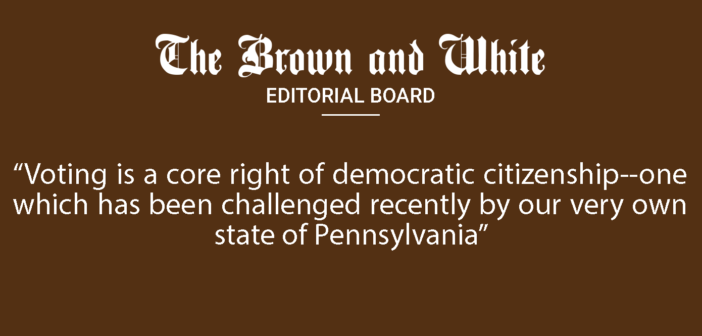OK, OK — I know we’re in college and we might never want to think about high school again, but let’s give it a shot for a second.
Remember taking your first social studies class? Photos of American presidents on the walls, an enlarged recreation of the Declaration of Independence displayed in front of the classroom — you remember, right?
Many young U.S. students are taught about our political and governmental procedures in school.
From a young age, it’s instilled in us that we have an important civic duty as citizens: We will grow up and be responsible for voting in our local and national elections in pursuit of electing leaders for the common good.
Voting is a core right of democratic citizenship — one which has been challenged recently by our very own state of Pennsylvania.
According to the Pennsylvania Commonwealth Court, as of 2019, the state’s constitution has required votes to be cast in-person unless voters meet certain requirements excusing them from doing so — requirements which allow people to cast their ballot by mail, thus increasing accessibility to voting. Many people will recognize this as “no excuse mail-in voting” or Act 77.
Consider those who may not have the means to commute to polling locations on Election Day due to a lack of transportation. Think about those who may be temporarily out of their municipality. Think about those who work multiple jobs and cannot afford to spend time on a weekday away from work. Think about those who have an illness or disability. Act 77 helps those who have a few more hurdles to cross when carrying out their civic duty.
In light of the pandemic, we’ve since seen the effectiveness of absentee ballots and the powerful impact it has on peoples’ ability to still vote when unable to visit polling stations in person.
In 2020, during the first general election in which the law was in effect, 2.6 million Pennsylvanians voted by mail to mitigate the spread of COVID-19 among the long lines typical of polling stations.
In fact, despite many being unable to or not wanting to vote in person, the 2020 presidential election had the highest voter turnout of the 21st century, with approximately 67 percent of citizens 18 years and older voting — this number can be attributed to increased access to voting, along with high partisan tension.
However, two years later, the Pennsylvania Commonwealth Court just ruled that Act 77 is unconstitutional, in an effort to strike down “no excuse mail-in voting.” Despite this, the law will remain in place, at least for the near future, regardless of the state judge’s order that would have made it expire in two weeks.
In other words, Pennsylvanians would no longer have been able to vote by mail if this strike followed through — just in time for primary elections on May 17.
With much outcry from those still in opposition to President Joe Biden’s legitimacy as The U.S.’s current leader, Act 77 has become a target for many Republican legislators (who previously voted in favor of the bill) due to concerns of voter fraud (although, there has been no evidence found reinforcing these claims).
Since when has the right to vote become polarized? When did the practice of democracy become a partisan issue?
In our eyes, this ruling could have silenced those unable to go to the polls in person, ultimately shutting down some of our country’s most important voices — the voices that may need the most help from our government.
Further, Pennsylvania is known for its status as a swing state. In past nation-wide elections, Pennsylvania has determined our elected presidents, sometimes voting red and sometimes blue.
If the number of silenced voices were to grow, who’s to say whether our elected officials are truly as representative of the beliefs and desires of the Pennsylvainian people as they should be?
Shouldn’t the country’s primary goal be to increase voting accessibility rather than diminish it?
Not to mention: the pandemic has not yet ended. Particularly the elderly and immunocompromised, this is concerning.
So we ask, why aren’t we trying to make voting easier? Shouldn’t we ensure every citizen has the ability to put one of their First Amendment rights to use?
This isn’t a matter of election fraud and it never has been. It’s a matter of silencing the voices of the people.






Comment policy
Comments posted to The Brown and White website are reviewed by a moderator before being approved. Incendiary speech or harassing language, including comments targeted at individuals, may be deemed unacceptable and not published. Spam and other soliciting will also be declined.
The Brown and White also reserves the right to not publish entirely anonymous comments.
3 Comments
Sure. Who could disagree. The issue is LEGAL voting. Until there is a full forensic audit in PA, many on both the right and left are suspicious that Joe Biden won more votes than BHO. And audit would end the controversy once and for all. As far as mail in voting is concerned, we had that all along. All you need to do was apply for an absentee ballot. We all want free and fair election, but they must be legal.
“audit would end the controversy once and for all”. It should, but Georgia has counted three times and the result is still not satisfying to our former president, his minions and thralls. Yes they found some dead people who voted (my husband told me to do so before he died so I carried out his wishes) and some who voted illegally in different ways.
The outcome was a minimal change in the totals with a slight increase in Biden votes. The drive to win produced creativity in developing stories that would explain a Trump win. No elections are “perfect” but most are probably fair.
“This isn’t a matter of election fraud and it never has been. It’s a matter of silencing the voices of the people.” It is a matter of winning and losing. Politicians and political parties are all about winning. They will do just about anything that they can get away with in order to win, this includes the raising money aspect.